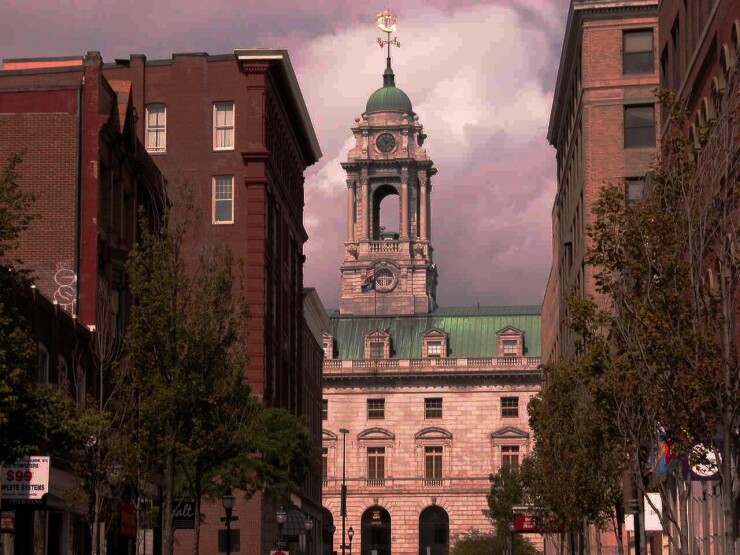Faced with dueling bond proposals, Portland, Maine, voters overwhelmingly decided to borrow $64.3 million to renovate Longfellow, Lyseth, Presumpscot and Reiche elementary schools in a plan that was backed by a majority of school board and City Council members.
The vote was 13,742 to 7,445, or 65 percent in favor.
“We’re overjoyed by this grass-roots victory for our children and our city’s schools,” said Emily Figdor, a leader of the four-school campaign. “You can’t have a strong city without strong schools. We’d like to get started as soon as possible. The problems are urgent and they need our attention right away.”

A competing bond measure called for borrowing $32 million to renovate only Lyseth and Presumpscot schools. It was supported by people who want to wait and see if the state will pay to renovate or replace Reiche and Longfellow.
The vote was 10,541 to 9,907, or 52 percent in favor. Voters were able to vote “yes” or “no” on either or both questions. If both won a majority, then the measure with the most “yes” votes was approved.
While supporters of the four-school bond said it wasn’t fair to fix some schools and not others, supporters of the two-school bond said it wasn’t practical or fair to taxpayers to forgo potential state funding.
“We’re very happy with the votes we received and proud of our campaign,” said Joanie Gildart, a leader of the two-school campaign.
Gildart said she was disappointed that Portland won’t be able to take advantage of state funding that might be available soon to renovate or replace Reiche and Longfellow.
“We feel terribly about that,” she said. “Taking on debt of this magnitude will make it challenging to take care of 17 schools going forward and have a significant impact on the affordabilty of living in Portland.
City officials estimate that the four-school $64 million bond – which would be $91 million with interest – would increase property taxes by 3 percent over a 26-year period. That is expected to cost the owner of a $225,000 house an average of $104 a year, or $2,700 over the life of the bond, said Deputy City Manager Anita LaChance.
The two-school, $32 million bond – $45 million with interest – would increase property taxes by 1.5 percent over a 22-year period, adding an average of $59 a year to the tax bill, or $1,300 over the life of the bond, LaChance said.
The state, which provides construction funds for the neediest schools, closed the most recent funding cycle in September 2016, just as Reiche and Longfellow had moved up to No. 2 and No. 3 on the list of projects in line for funding. Typically, no more than about a dozen schools receive money in any funding cycle.
Supporters of the two-school referendum said they would immediately support a second bond issue to cover the next two schools if the state’s list doesn’t give priority to Reiche and Longfellow. The state is expected to release a proposed priority list in spring 2018 and a final priority list in August 2018.
The school board has raised the issue of renovating the four schools for more than two decades. The schools haven’t received significant capital investment since they were built 40 to 65 years ago.
The schools have outdated heating systems and windows and a variety of structural problems, including asbestos and auditoriums that don’t meet modern safety codes. Students attend classes in modular buildings because of crowding and in classrooms without walls, and receive non-classroom instruction in hallways and converted closet spaces.
The push for a four-school solution quickly polarized as parents launched a well-coordinated campaign to speak out at public meetings and attend school tours, keeping pressure on the school board and City Council. The two-school plan emerged in March, when city councilors Nicholas Mavodones, Jill Duson and Belinda Ray announced support to put a smaller bond issue on the ballot.
The four-school supporters, Protect Our Neighborhood Schools, canvassed neighborhoods on weekends, ran a social media campaign and put up lawn signs around town. They saw no significant opposition until early October, when Dory Waxman, a former city councilor, and former state Sen. Justin Alfond launched the Better Schools, Better Deal campaign for the two-school bond option.
Each group raised thousands of dollars to promote their campaigns. Protect Our Neighborhood Schools had more than $21,000 on hand on Oct. 1 and raised an additional $16,600 by Oct. 24, according to campaign finance reports. The group received $25,000 from Progressive Portland’s ballot question committee and $4,800 from Citizens Who Support Maine’s Public Schools.
Better Schools, Better Way raised nearly $14,300 in October, including $6,000 from Bayside Maine, a limited liability company headed by former state Sen. Justin Alfond. Other notable donations were $3,000 from Cyrus Hagge, $1,000 from Tom Watson of Port Properties Management and $100 from former Mayor Michael Brennan.





